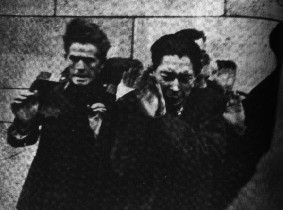 I had two communications from Budapest just after the riots were over. One, from a man whose political opinions I know well, said that the troubles were over and Orbán lost (as usual) and this was utterly predictable. The other, from someone who has strong anti-socialist feelings but is, perhaps, less involved in Hungarian life, said that this was just the beginning. Thousands of people demonstrated in Budapest and tens of thousands in the rest of the country. As it happens I have doubts about both communications but neither do I believe the government line that it is immensely popular with only a few fascist extremists opposing it.
I had two communications from Budapest just after the riots were over. One, from a man whose political opinions I know well, said that the troubles were over and Orbán lost (as usual) and this was utterly predictable. The other, from someone who has strong anti-socialist feelings but is, perhaps, less involved in Hungarian life, said that this was just the beginning. Thousands of people demonstrated in Budapest and tens of thousands in the rest of the country. As it happens I have doubts about both communications but neither do I believe the government line that it is immensely popular with only a few fascist extremists opposing it.If I have doubts about the government line, the Western media apparently does not, though finds it hard to understand what or where Hungary is. (I was amused to see Kate Connolly of the Daily Telegraph reporting about the riots from Bucharest. Wrong country, dear, though the two places do sound the same.)
Yesterday’s International Herald Tribune had an article that tried to sum up what has gone wrong with the various East European countries that so many hopes were attached to. Alas, the article did not seem to think that inappropriate tax and regulatory structures imposed on relatively weak economies and even weaker political systems could just result in problems. I have been saying this since 1998 and take no pleasure in seeing most of the predictions we made with Bill Jamieson at the time coming true.
The New York Times journalist who was responsible for the rather incoherent article did seem to take the Hungarian government’s analysis for granted:
That pattern [backlash to radical reforms] was on full display last week when rightist, nationalist demonstrators clashed with the police, hijacking what was to have been a solemn commemoration of Hungary's failed 1956 uprising against Soviet domination a half century ago.Since the article later says that there were tens of thousands of demonstrators (without explaining where) one begs leave to doubt that all of them were rightist nationalists. Also, one rather wonders about that hijacking of the celebrations. Did they really belong to the Socialist government and its foreign pals, such as the former Maoist Barroso? Did it not belong to the Hungarian people, who were banned from Kossuth Square, outside the Parliament building? Could it have been that feeling of frustration that motivated some of the rioters?
 Why do I have problems with the two accounts? In the first place I do not believe Orbán lost though he has not managed to capitalize on Gyurcsány’s behaviour. FIDESZ did very well in the recent local elections and is still the most popular party around. Its boycott of ministerial speeches and of the Socialist government’s appearance with crocodile tears at the ready at anniversaries of the 1956 uprising plays quite well in many parts of the country, even in Budapest, which, as most Central European cities, tends to be more left-wing than the rest of the country.
Why do I have problems with the two accounts? In the first place I do not believe Orbán lost though he has not managed to capitalize on Gyurcsány’s behaviour. FIDESZ did very well in the recent local elections and is still the most popular party around. Its boycott of ministerial speeches and of the Socialist government’s appearance with crocodile tears at the ready at anniversaries of the 1956 uprising plays quite well in many parts of the country, even in Budapest, which, as most Central European cities, tends to be more left-wing than the rest of the country.The trouble with Orbán is that he is not quite a good enough politician, in which both he and his opponent, the present Prime Minister, follow a historical pattern. With one or two exceptions, Hungary has not been well served with politicians, though there was a certain amount of talent at the disposal of the Austro-Hungarian Empire.
When Orbán became leader of FIDESZ there were high hopes that he would turn it into a western style right-wing party, perhaps on the model of the British Conservative one (when it exists, that is). Alas, those hopes have not come to much. In the West he often talks the talk of free trade, liberalism, small government and low taxation but back home he has thrown in his lot with the more nationalist, protectionist, statist and welfare-oriented sections of the political spectrum.
On the other hand, I am not impressed by the implied (and sometimes overt) comparisons with the actual 1956 uprising. There seems to have been some very unpleasant behaviour by the police and even the European Commission is asking questions about it. This must gall the Commission more than somewhat as they had supported Ference Gyurcsány against the “nationalist” and supposedly eurosceptic Viktor Orbán.
Still, nobody was killed, which already makes it different and, more to the point, there was no real focus to the riots. After all, Gyurcsány had been re-elected and the opposition together with the media ought to have made certain that those lies were exposed in the election campaign. A referendum on the proposed reforms might sound like a good idea – and FIDESZ is heavily banking on that – but how would it be achieved in practice? A referendum has to have a yes or no answer. Would there be just one question for all reforms or several questions for different reforms? What of alternatives to the government’s proposals?
So, Orbán has not lost but neither has the government, particularly as it is well in control of the Parliamentary deputies. We are not seeing another uprising, which is just as well, since a good deal of it was very nasty, indeed, even before the Soviet tanks rolled back and it was put down with great brutality. There were many scores settled in an unpleasant fashion and the overwhelming majority of people hid in shelters, hoping that there would be no searches for those who had any kind of an official job, however lowly.
 Those who have real memories of those events may well find that these are somewhat more ambivalent than present accounts are to be believed, though the astonishing courage and achievement of those almost insanely brave men and women does need to be saluted.
Those who have real memories of those events may well find that these are somewhat more ambivalent than present accounts are to be believed, though the astonishing courage and achievement of those almost insanely brave men and women does need to be saluted.Not a revolution, not even an uprising. But, maybe a sign of times to come. It was always on the cards that the European Project would founder in its expansion so far eastwards.
COMMENT THREAD
